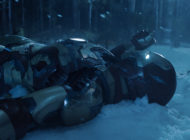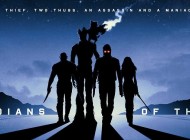The Underworld EVOLVES
 “Viktor was not the savior I had been led to believe. He had betrayed us all… My only hope now is to awaken Markus, our last remaining elder, and expose the truth…”
“Viktor was not the savior I had been led to believe. He had betrayed us all… My only hope now is to awaken Markus, our last remaining elder, and expose the truth…”
As we review the second film in the Underworld series, Evolution, it stands among the tightest of sequels in that, like Back to the Future II or The Two Towers, it doesn’t just extend a franchise but picks up seconds after the first film’s cliffhanger ending. It expands the theme of life, truth, and purpose being upended by stark revelations: that the leaders and fathers of this world have lied and manipulated our protagonists and pointed them in the wrong direction. Although Selene believes her “only hope” is that of another Vampire leader, it turns out Marcus holds his own deeper layers of deception and is an even worse kind of evil than Viktor.
Sibling Rivalry & Consequences
The biblical story of twins Jacob and Esau tells us of two sons jealous for birthright and dominance, one a slimmer boy who whispers deceit into his family’s ears, and the other a hairy boy who is more rash and brusque. This true narrative finds an echo in the fictional narrative of Underworld: Evolution, as the deceptive Marcus and bestial William are revealed to be the immortal sons who became the first Vampire and first Lycan, their attitudes and behaviors have wreaking generational conflict and curse. Marcus now seeks to reunite with his brother, and his plan is to create “a new race created in the image of their maker. Their new God. Me.”
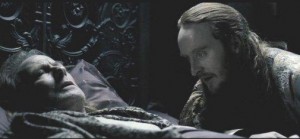 Selene is not simply a victim – she’s clearly confronted with the fact that she’s contributed to this cycle by her own actions – but the film resonates with those who intuitively feel that generational brokenness and snowballing legacies of lies, pain and sin that have deep roots in our true, shared story. Just as Jacob went to his father’s bedside and whispered deceit, we see Marcus in a flashback whispering to the aging Viktor (Selene’s vampiric “father”). This “patient zero” reflects not just a usurping Jacob, but the devil himself. Marcus is the father of lies, promising power he can’t truly deliver “if only you submit to him”. He’s a manipulator with every word and action, a snake in the garden; he even hides behind those he deceives, as we discover it was his idea to have Viktor pretend to be the original instead of him.
Selene is not simply a victim – she’s clearly confronted with the fact that she’s contributed to this cycle by her own actions – but the film resonates with those who intuitively feel that generational brokenness and snowballing legacies of lies, pain and sin that have deep roots in our true, shared story. Just as Jacob went to his father’s bedside and whispered deceit, we see Marcus in a flashback whispering to the aging Viktor (Selene’s vampiric “father”). This “patient zero” reflects not just a usurping Jacob, but the devil himself. Marcus is the father of lies, promising power he can’t truly deliver “if only you submit to him”. He’s a manipulator with every word and action, a snake in the garden; he even hides behind those he deceives, as we discover it was his idea to have Viktor pretend to be the original instead of him.
The Sin of Self-Image
 Now, instead of imaging his creator, Marcus wants the world to image HIM. It’s the sin that got Satan kicked out of heaven, and the poison he’s spread that’s infected ALL of humanity. We all at some point want to be worshipped by others for our image instead of imaging the one worthy of worship. Although I personally didn’t find actor Tony Curran’s Marcus as compelling a villain as Bill Nighy’s Viktor, the Underworld narrative has given us it’s version of “ultimate evil”.
Now, instead of imaging his creator, Marcus wants the world to image HIM. It’s the sin that got Satan kicked out of heaven, and the poison he’s spread that’s infected ALL of humanity. We all at some point want to be worshipped by others for our image instead of imaging the one worthy of worship. Although I personally didn’t find actor Tony Curran’s Marcus as compelling a villain as Bill Nighy’s Viktor, the Underworld narrative has given us it’s version of “ultimate evil”.
Underworld’s Adam, a Failed Father
The best acting in the film comes from veteran Derek Jacobi, who stands revealed as Corvinus, immortal father to the chaos-causing twins. Despite a regal demeanor, he shows how ineffectual his ability to deal with his sons has been:
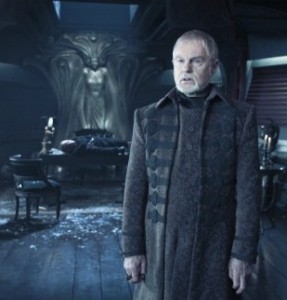 “For centuries I’ve stood back and watched the havoc my sons have wrought on each other, and on humanity – not the legacy I prayed for the morning I watched them enter this world… And it’s been a tiresome duty – keeping the war contained, cleaning up the mess, hiding my family’s unfortunate history.”
“For centuries I’ve stood back and watched the havoc my sons have wrought on each other, and on humanity – not the legacy I prayed for the morning I watched them enter this world… And it’s been a tiresome duty – keeping the war contained, cleaning up the mess, hiding my family’s unfortunate history.”
Containment. Hiding. These are the words Corvinus uses to describe his parenting. There is nothing redemptive about his interaction, simply the corralling of behavior and covering it up, and the story clearly establishes that this method is found wanting, which provides a brilliant parallel to a deeper truth. How many parents simply address their children’s behavior, instead of pursuing their hearts? How many merely employ methods that punish the body or mind, or simply keep the mess out of sight for fear of public image? The disastrous and ultimately uncontainable impact of Marcus and William illustrates the failure of behavior modification, or simply seeking to keep family problems under the rug. It’s impossible, and provides no real or long-term solution. Corvinus has failed, and must demonstratively pass the task of rectification to someone else.
Corvinus is Underworld’s Vampire/Lycan version of the biblical Adam. Not only is his sin a form of abdication, failing to ultimately address or deal with the problems at hand, but his children are like Cain and Abel and their offspring. From the first two brothers to all generations that follow, they are at each other’s throats. Once again, we have a story that illustrates how the fallen father of this world can’t provide any real salvation or reconciliation from the cycle of death.
New Man, Resurrected
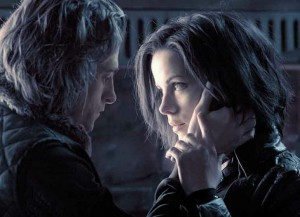 Definite Spoiler ahead. As in our review of the first film, to suggest that the fully Lycan, fully Vampire Michael reflects the biblical answer in Christ would be like saying a pebble is like statuary because they’re both made of rock. However, the story’s solution to the problem once again toys with glimmers of savior in the final sequence of the film when a dead Michael resurrects to tip the balance and equip his battling bride with the power she needs to vanquish the monstrous sons of Corvinus. As the legacy of war and sin is washed away amidst a massive amount of blood and gore, we see Selene truly saved, set free, life no longer defined by her dark lineage and her body able to stand in the light.
Definite Spoiler ahead. As in our review of the first film, to suggest that the fully Lycan, fully Vampire Michael reflects the biblical answer in Christ would be like saying a pebble is like statuary because they’re both made of rock. However, the story’s solution to the problem once again toys with glimmers of savior in the final sequence of the film when a dead Michael resurrects to tip the balance and equip his battling bride with the power she needs to vanquish the monstrous sons of Corvinus. As the legacy of war and sin is washed away amidst a massive amount of blood and gore, we see Selene truly saved, set free, life no longer defined by her dark lineage and her body able to stand in the light.
“…for at one time you were darkness, but now you are light in the Lord. Walk as children of light” – Ephesians 5:8
This has always been a powerful metaphor fictional vampirism parallels with our own condition – cursed to walk in darkness – and the second film ends with release from that bondage and hope for the future. Do we have such a hope? The third film goes on to give us our most obvious messianic metaphor yet…


